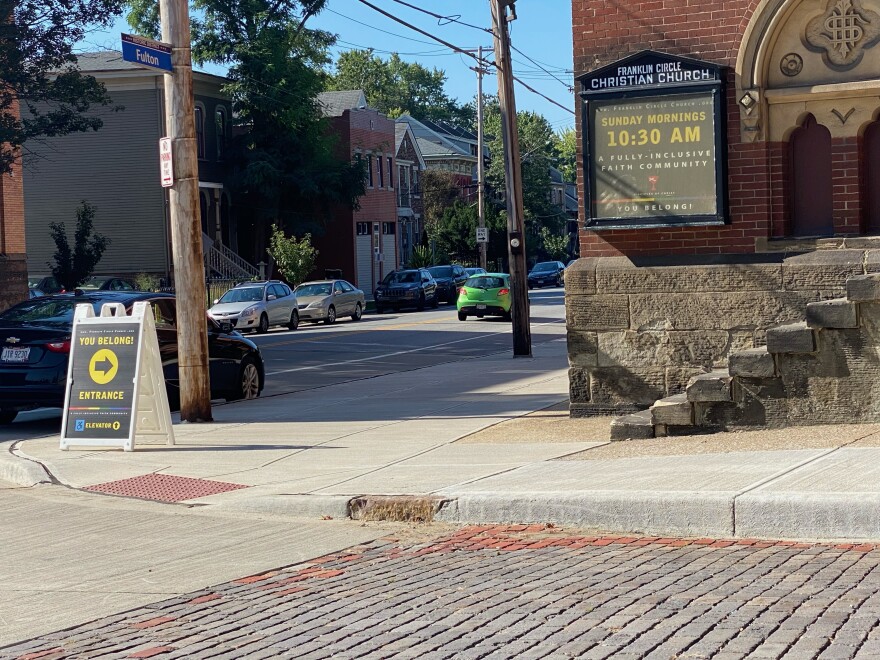On a recent Sunday, nearly 40 congregants gathered together for worship service at the Franklin Circle Christian Church on Cleveland’s near West Side to hear Pastor Richard Hinkelman deliver his Sunday message focused on a well-known verse of the prophet Micah:
“God has shown you, oh mortal, what is good. And what does the Lord require of you? To ask justly, to love mercy and to walk humbly with your God.”
Hinkelmen then pivoted to the personal to help illustrate the importance of Micah’s words.
“Many of you might know my story that I grew in a very conservative faith tradition,” he said. “When I began wrestling with my sexual orientation and identity, the church that I was employed at in Pittsburgh forced me to go into conversion therapy to fix me, to make me become straight, normal.”
Because people routinely told him he was going to hell for being gay, Hinkleman said he drove from Pittsburgh to Akron twice a week to undergo conversion therapy at a counseling practice called Emerge.
"It didn’t work, by the way,” he said.
Ideastream Public Media reached out to Emerge, but they did not respond to our request for comment. The agency advertises on its website that its methodology includes “an integration of Biblical truth resulting in practical sanctification.”

Conversion therapy is legal in Ohio, but since June three Ohio cities have moved to ban it.
On June 21, the city of Cleveland Heights passed an ordinance prohibiting professionals from practicing conversion therapy on minors. Mayor Kahlil Seren explained that such a law is as symbolic as it is preventative.
“If we didn’t have any homicides last year, it doesn’t mean, ‘oh well, I guess we don’t need any laws against homicide,’" he said. “The idea is that the harm is real.”
On June 27, the city of Reynoldsburg outside of Columbus unanimously passed an ordinance banning conversion therapy, and on July 13 the Cleveland City Council introduced language that would do the same. It is expected to pass in September.
Conversion therapy, also called reparative therapy or reintegrative therapy, is defined as any intervention to change a person’s sexual orientation, gender identity or gender expression. The practice, now widely discredited, is based on the idea that LGBTQ+ people suffer from mental illnesses that can be cured through medical, spiritual or physical interventions.
Conversion therapy is opposed by the American Psychiatric Association, American Academy of Child and Adolescent Psychiatry, American Medical Association and other health advocacy groups.
It has been found to increase anxiety, depression and thoughts of self-harm, according to the Williams Institute, a think tank at the University of California Los Angeles that studies sexual orientation and gender identity law and public policy.
At least 20 U.S. states have laws on the books banning conversion therapy on minors, according to the Movement Advancement Project, a nonprofit that tracks laws that affect the LGBTQ+ community.
Although other states have banned the practice, LGBTQ+ advocates say it is still happening across Ohio.
“Sadly conversion therapy is alive and well in Ohio — as we know it is across the nation,” said Jochum. “It is being practiced, and we’re aware of this because we get reports of this happening.”
Efforts to ban conversion therapy statewide have stalled for years.
Ohio State Democrat Rep. Mary Lightbody is the sponsor of House Bill 420 which would suspend, revoke or refuse to issue a license to healthcare professionals who engage in conversion therapy on minors. Lightbody, who represents a district in the Columbus area, said due to gerrymandered political districts, she is not optimistic that the bill will pass.
Gerrymandering is “the manipulation of political districts to rig the outcome of elections to favor one political party or candidate over another,” according to the League of Women Voters. In Ohio, Republicans control the legislature and the governor’s office.
“What’s the chance of my bill moving forward?” Lightbody said. “Slim to none.”
Ohio House Republican Rep. Scott Lipps, from Franklin Ohio, chair of the Health Committee where Lightybody’s bill sits, did not respond to a request for comment on the bill.
But while H.B. 420 and a similar bill in the Ohio Senate are languishing, some local Ohio municipalities have already outlawed the therapy.
In 2015, Cincinnati became the first city in the nation to ban conversion therapy, following the highly-publicized suicide of Leelah Alcorn, a 17-year-old transgender teen.
“Her parents forced her to go to conversion therapy and isolate herself from all of her friends and support systems. That led her to step in front of a semi to take her own life,” said Chris Seelbach, a former Cincinnati City Councilperson and a survivor of conversion therapy. “That started a conversation around the entire world about how harmful conversion therapy really is.”
Cincinnati’s ban has been enforced since its passing, including in 2020 when a local counselor was forced to remove conversion therapy language from his website, Seelbach said.
“This isn’t some static law that’s sitting on a shelf somewhere,” he said. “We’re actually using it.”
The sudden increase in efforts to ban conversion therapy on the municipal level is a response to a slate of Republican-sponsored anti-LGBTQ+ legislation at the state level, said Alana Jochum, executive director of Equality Ohio.
“We have a good sense that some more bans are coming,” said Jochum. “And really we like to think of them not ... as bans, but as protections — overt protections — for our LGBTQ youth. So I would just say, stay tuned to a city near you.”
Copyright 2022 WKSU. To see more, visit WKSU.


